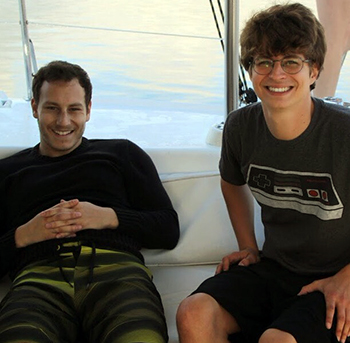Startup co-founded by SEAS alumnus helps doctors monitor their patients’ health conditions
Have you ever left a medical appointment and realized you’ve forgotten everything the doctor said?
A company co-founded by a pair of Harvard graduates lets doctors provide personalized reminders to patients via text messages to their mobile phone.
Tá Na Hora, a Brazilian company launched in 2014 by computer science concentrator Thomas Prufer, A.B. ’11, and economics concentrator Mike Kapps, A.B. ’12, uses Short Message Service (SMS) text messaging technology to enable heath care providers to closely monitor patient behavior.
“ Oftentimes, patients don’t absorb all the information they receive in a doctor’s office,” Prufer said. “Giving the patient the right information at the right time can help to change that patient’s behavior.”
Oftentimes, patients don’t absorb all the information they receive in a doctor’s office,” Prufer said. “Giving the patient the right information at the right time can help to change that patient’s behavior.”
Tá Na Hora (which means “on time” in Portuguese) creates an interactive decision tree based on a series of customized text messages for a specific group of patients. Depending on each patient’s needs, personalized messages are automatically sent at specific times. Patients’ responses determine the subsequent messages they receive, and help doctors, nurses, or pharmacists keep tabs on their patients’ health status.
For example, text messages sent at specific intervals could remind a diabetic patient to perform a blood glucose test and respond with the results. A health care provider who reviews that information could quickly contact the patient if the text messages raise any red flags. Automated text messages allow health care providers to significantly reduce call center expenses, Prufer said.
A neurobiologist serves as the company’s chief content officer, helping clients develop medical messages that will be easily understood by patients, explained Kapps, who serves as the company’s CEO. The SMS-based system is especially useful in Brazil, since it can reach patients in even the most remote corners of the Amazon rainforest.
Prufer decided to launch their startup in his native Brazil because it is a unique concept for the Brazilian market. The nation of more than 200 million people is served by both private and state-run medical and insurance companies. By providing a scalable system, Tá Na Hora is able to serve a range of customers, from small, local clinics to enormous insurance companies. Prufer and Kapps opted for SMS technology instead of an app because Brazil lacks the high level of smartphone penetration that exists in the United States.
“For me, it has been extremely rewarding to build something new for a part of the world that lacked this service before,” Prufer said. “I’m excited that we can use this technology to help people.”
The company works to meet the needs of different patient groups. The development team has tailored the system to monitor pain levels in post-surgical patients, for example, and to provide infant care information to new mothers. Tá Na Hora has been especially effective at raising awareness of dengue fever, a mosquito-borne tropical disease with symptoms similar to those of a serious cold. A major pharmaceutical company used the system to effectively monitor fever outbreaks in underserved communities throughout Brazil.
Prufer is convinced that similar successes will continue to fuel the startup’s growth. Ta Na Hora serves about 30,000 patients today and is poised to expand its network to 100,000 patients by the end of the year, with the long-term goal of surpassing one million patients.
While Prufer has enjoyed actively leading Tá Na Hora through its initial stages, he recently stepped back from day-to-day operations to pursue a career in Silicon Valley. He now works in a San Francisco tech incubator, Runway, where he draws on his expertise to help entrepreneurs forge critical business relationships.
“It’s exciting to be on both sides of the coin. Helping startups succeed here in California has enabled me to help my own startup grow,” he said. “Creating connections and building friendships, like I did with Mike back when we were Harvard students, that’s what really creates strong, lasting companies.”